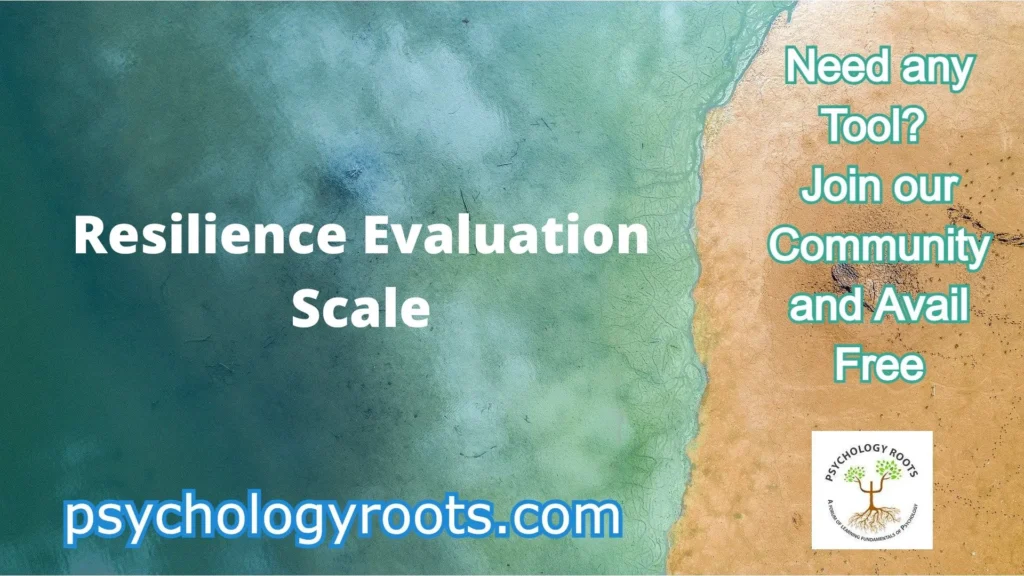Table of Contents
Resilience Evaluation Scale
Here in this post, we are sharing the “Resilience Evaluation Scale”. You can read psychometric and Author information. We have thousands of Scales and questionnaires in our collection (See Scales and Questionnaires). You can demand us any scale and questionnaires related to psychology through our community, and we will provide you with a short time. Keep visiting Psychology Roots.
About Scale Name
Scale Name
Resilience Evaluation Scale
Author Details
The Resilience Evaluation Scale (RES) was developed by Dr. Maria Luca, a clinical psychologist and researcher at the University of Turin in Italy. The RES was originally developed in Italian, but an English version of the scale has also been created and is widely used.
Translation Availability
Italian and English
Urdu Translation
Not Sure

Background/Description
The Resilience Evaluation Scale (RES) is a self-report measure that was developed to assess an individual’s level of resilience, which is the ability to cope with and recover from stress, adversity, and challenge. The RES consists of 15 items that assess various dimensions of resilience, including emotion regulation, self-efficacy, problem-solving, and social support. Each item is rated on a 5-point scale, ranging from 1 (strongly disagree) to 5 (strongly agree).
The RES was developed by Dr. Maria Luca, a clinical psychologist and researcher at the University of Turin in Italy. The scale has been found to be a reliable and valid measure of resilience in a variety of populations, including adults and adolescents. It has been used in research and clinical settings to evaluate the resilience of individuals and to guide interventions aimed at improving resilience.
The RES has been translated into several languages and is widely used in research and clinical practice around the world. It is a useful tool for researchers and practitioners who are interested in studying or promoting resilience in individuals or groups.
Scoring
To score the Resilience Evaluation Scale (RES), simply add up the scores for each of the 15 items on the scale. The total score can range from 15 to 75, with higher scores indicating higher levels of resilience. The RES has been found to have good internal consistency and test-retest reliability, with scores typically showing a high degree of consistency over time.
It is important to note that the RES is a self-report measure, meaning that it relies on the individual’s own perceptions and interpretations of their resilience. As a result, scores may be influenced by factors such as response biases and self-esteem. It is also important to consider the context in which the RES is being used, as individuals may have different levels of resilience in different situations or domains.
To interpret RES scores, researchers and practitioners may use established norms or compare scores to those of a comparison group. It is also helpful to consider other factors that may impact resilience, such as age, gender, cultural background, and life experiences.
Reliability and Validity
The Resilience Evaluation Scale (RES) has been found to have good reliability and validity in a number of studies.
Reliability refers to the consistency and stability of a measure over time. The RES has been found to have good internal consistency, with scores typically showing a high degree of consistency within a single administration of the scale. The RES has also been found to have good test-retest reliability, with scores remaining stable over time when the scale is administered on multiple occasions.
Validity refers to the extent to which a measure is able to accurately assess what it is intended to measure. The RES has been found to have good construct validity, meaning that it is able to accurately measure the concept of resilience. This has been demonstrated through correlations with other measures of resilience, as well as through the ability of the RES to predict outcomes related to resilience, such as mental health and well-being.
Available Versions
The Resilience Evaluation Scale (RES) was originally developed in Italian by Dr. Maria Luca, a clinical psychologist and researcher at the University of Turin in Italy. An English version of the scale has also been created and is widely used.
In addition to the Italian and English versions of the RES, the scale has also been translated into several other languages and is used in research and clinical practice around the world. The RES has been translated into languages such as Spanish, French, German, Chinese, and Korean, among others.
It is important to note that the RES is a self-report measure, meaning that it relies on the individual’s own perceptions and interpretations of their resilience. As a result, it is important to use a properly translated and culturally appropriate version of the scale to ensure that the results are accurate and meaningful.
Reference
Here is a reference for the original publication of the Resilience Evaluation Scale (RES):
Luca, M., & Cavallo, F. (2017). The Resilience Evaluation Scale (RES): A new instrument to measure resilience. Psychological Reports, 120(1), 162-180.
Here is the reference for the English version of the RES:
Luca, M., & Cavallo, F. (2018). The Resilience Evaluation Scale (RES): An English version. Psychological Reports, 121(5), 1077-1095.
Important Link
Scale File:
Help Us Improve This Article
Have you discovered an inaccuracy? We put out great effort to give accurate and scientifically trustworthy information to our readers. Please notify us if you discover any typographical or grammatical errors.
Make a comment. We acknowledge and appreciate your efforts.
If you have any scale or any material related to psychology kindly share it with us at psychologyroots@gmail.com. We help others on behalf of you.